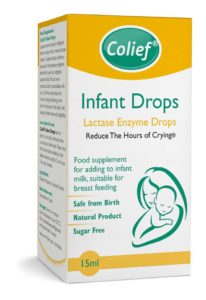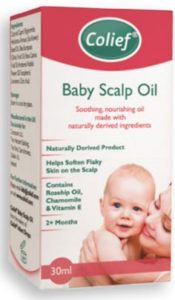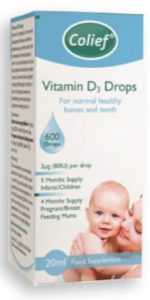As if it wasn’t enough that you now have a new little baby needing to be fed at odd hours and you are doing what you can to get some sleep inbetween, there happen to be further problems that can raise their heads in the early days. Colic and cradle cap are just two problems that can occur in those early days and can drive you crazy. Fortunately there are some products that can help and SA Mom blogs will be giving some of these away.
 Colic can be a real awful thing to go through, for both the mom and baby. I put my poor mom through this. She told me that every day at about 4pm I would just start crying and nothing seemed to help. Colic is defined as severe pain in the abdomen caused by wind or obstruction in the intestines and suffered especially by babies. The problems of colic often start several weeks after birth, then peak at around six weeks, lasting for about three or four months.
Colic can be a real awful thing to go through, for both the mom and baby. I put my poor mom through this. She told me that every day at about 4pm I would just start crying and nothing seemed to help. Colic is defined as severe pain in the abdomen caused by wind or obstruction in the intestines and suffered especially by babies. The problems of colic often start several weeks after birth, then peak at around six weeks, lasting for about three or four months.
Some tips for Colic:
 Keep track: Write down when baby cries, for how long and any possible triggers. (nappy, sleep, hot, cold, dummy) So if one of these works it can be a tiny victory. Knowing the pattern also helps you prepare as a mom.
Keep track: Write down when baby cries, for how long and any possible triggers. (nappy, sleep, hot, cold, dummy) So if one of these works it can be a tiny victory. Knowing the pattern also helps you prepare as a mom.- Keep late afternoon and early evening clear: As colic crying seems to happen around these times, get things done that need doing in other parts of the day where possible, so that you are there for your baby during this time.
- Keep calm and sooth: Rocking, sucking and holding baby close are activities you can do during this time. It might seem like it is not helping but the fact that you are present does not go unnoticed by your baby. You are providing security in a wave of pain.
- Keep connected: You’re not the only one going through this. Join up with another mom’s group and you may find you may encourage another mom going through the same thing.
- Keep Colief close:
 Rather than only treating the symptoms of colic, your infant’s colic-associated crying and tummy discomfort may be the cause of temporary lactose intolerance. Colief Infant Drops is one of the only colic supplements that works by breaking down the lactose in milk (naturally found in breastmilk) to help ease digestion. So you add it to your formula or breastmilk.
Rather than only treating the symptoms of colic, your infant’s colic-associated crying and tummy discomfort may be the cause of temporary lactose intolerance. Colief Infant Drops is one of the only colic supplements that works by breaking down the lactose in milk (naturally found in breastmilk) to help ease digestion. So you add it to your formula or breastmilk.
These infant drops have also undergone successful studies Kearney (1998) and Kanabar (2001).
 Cradle cap is flaky, dry skin that looks like dandruff, or thick, oily, yellowish or brown scaling or crusting patches on your baby’s scalp.
Cradle cap is flaky, dry skin that looks like dandruff, or thick, oily, yellowish or brown scaling or crusting patches on your baby’s scalp.
Colief Baby Scalp oil contains rosehip oil, chamomile and Vitamin E. Simply massage into the skin or scalp and the oils will help sooth and moisturise. Suitable for babies older than two months.
 Our last item, unrelated to the above but necessary for general health is Vitamin D. In fact when I went to a dietician for fertility help one of the first things she did was make me take a blood test for Vitamin D. It turned out that it was a bit low and she actually prescribed a higher dose. Vitamin D is essential for bones and teeth development and also for boosting your immune system. We can absorb it from the sun as well, but is it enough?
Our last item, unrelated to the above but necessary for general health is Vitamin D. In fact when I went to a dietician for fertility help one of the first things she did was make me take a blood test for Vitamin D. It turned out that it was a bit low and she actually prescribed a higher dose. Vitamin D is essential for bones and teeth development and also for boosting your immune system. We can absorb it from the sun as well, but is it enough?
Growing kids 6 months to five years and pregnant and breastfeeding moms can really benefit from this. Colief also has VItamin D drops which contain 600 Drops (2µg (80IU) per drop) which is 5 months supply for infants and children and 4 months for pregnant and lactating moms. Not suirable for infants younger than one month or for those consuming 500ml or more of formula.

 The final portion of our prize is the Baby Sense book by Meg Faure, famous occupational therapist and speaker. Meg has spoken at Colief events and has some tips of her own to get through it.
The final portion of our prize is the Baby Sense book by Meg Faure, famous occupational therapist and speaker. Meg has spoken at Colief events and has some tips of her own to get through it.
SA Mom blogs is giving away the following two hampers:
1x Colief Infant Drops
1x Colief Scalp Oil
1x Colief Vitamin D3 Drops
1x Baby Sense book by Meg Faure
Value: R550 each.
Share with us some of your tips and follow some social media and win using the Rafflecopter mechanism below.



We use coconut oil for the cradle cap of our baby which also works okay.
To help baby with traped wind, after feeding baby lay her/him down flat for about 10 seconds and then bring baby up and burp baby, a tip from my mom and seems to work with my 3 month old
I make myself a big cup of tea, add a few rescue drops to it and try to keep calm as much as possible. A wheat bag warmed in the microwave and wrapped in a towel and placed on baby’s tummy also helps – just make sure the wheat bag is warm and not hot.